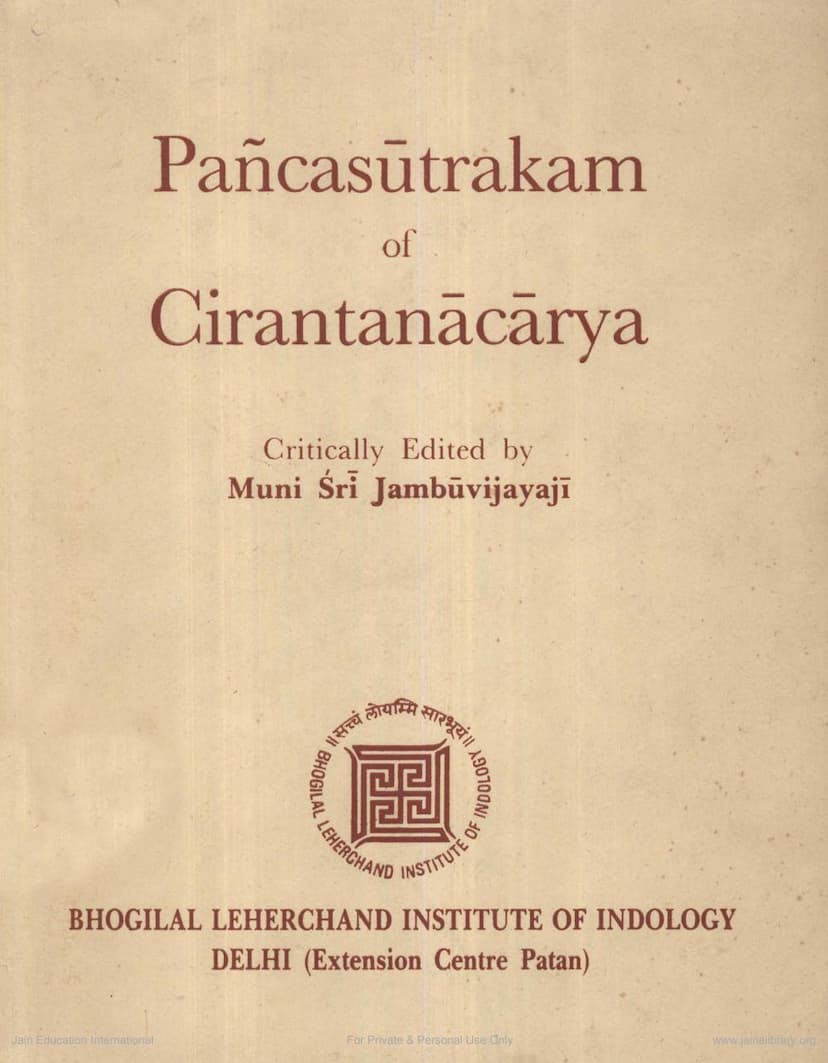Panch Sutrakam With Tika
Added to library: September 2, 2025
Loading image...

Summary
The book "Pañcasūtrakam with Tika" is a critically edited edition of an ancient Jain text attributed to Cirantanācārya, with a Sanskrit commentary by Acarya Haribhadrasuri. Edited by Muni Sri Jambūvijayaji, the work is published by the Bhogilal Leherchand Institute of Indology.
Key Aspects of the Work:
- Ancient Jain Treatise: The Pañcasūtraka is a significant work in post-canonical Jain literature, highly esteemed for centuries. It is considered a "priceless jewel" within Jain religious literature.
- Spiritual Guidance: The treatise provides spiritual guidance for Jain practitioners (mumukṣus), outlining a path towards liberation (mokṣa). It effectively describes the preparatory stage of the śrāvaka-dharma (layperson's religious duties) that leads to the more intense stage of sādhu-dharma (monk's duties).
- Daily Recitation: The Pañcasūtraka, particularly its first sutra, is widely recited daily by Jain monks, nuns, laymen, and laywomen, especially within the Svetāmbara tradition. The first sutra promises the destruction of inauspicious karmas and the attraction of auspicious karmas, leading to liberation when properly recited, heard, and meditated upon.
- Five Sections (Sūtras): The text is structured into five interconnected sūtras, each with an appropriate title, guiding the practitioner through spiritual progress:
- Pāpapratighātadharmagunabījādhāna-sūtra: Focuses on destroying sinful deeds and sowing the seeds of virtues and vows.
- Sādhu-dharma-paribhāvanā-sūtra: Deals with reflecting on the virtues and practices of a monk, fostering a desire to adopt the monastic path.
- Pravrajyā-grahaṇa-vidhi-sūtra: Details the proper procedure and conduct for accepting monastic initiation, including considerations like parental consent and ethical practices.
- Pravrajyā-paripālanā-sūtra: Explains the strict observance of monastic duties, emphasizing respect for the spiritual teacher, diligent study, and equanimity amidst challenges.
- Pravrajyā-phala-sūtra: Describes the ultimate fruit of asceticism – the state of liberation (siddhi or mokṣa), its nature, and the attainment of infinite bliss.
- Acārya Haribhadrasuri's Commentary: The work includes a Sanskrit commentary by the renowned Acārya Haribhadrasuri, a prolific Jain scholar of the 8th century. His commentary elucidates the text, providing insights and referencing earlier Jain and even non-Jain works. Haribhadrasuri is noted for his non-sectarian approach and mastery of both Sanskrit and Prakrit.
- Critical Edition: Muni Sri Jambūvijayaji, the editor, is a highly respected Jain scholar known for his sharp intellect, mastery of ancient languages (Sanskrit, Prakrit), and philosophical systems. His critical edition is based on a meticulous study of various palm-leaf and paper manuscripts, noting variant readings and providing scholarly introductions, notes, and appendices.
- Author of Pañcasūtraka: The original authorship of the Pañcasūtraka remains obscure, as the oldest manuscripts do not mention the author. Some scholars suggest Acārya Haribhadra himself might be the author, given stylistic similarities, while others believe it to be an anonymous work of ancient origin. The language used is Ardhamāgadhi prose, showing characteristics of canonical Jain prose.
- Influence and Significance: The Pañcasūtraka has profoundly influenced later Jain literature, with scholars like Haribhadrasuri and Hemacandra referencing and incorporating its teachings into their works. Its daily recitation and the philosophical depth contained within its concise verses highlight its enduring importance in Jain tradition.
- Editorial Rigor: The edition is lauded for its scholarly approach, employing multiple manuscripts, detailed footnotes, cross-references, and appendices that include the text in its original form, glossaries of specific terms, and explanations of quoted passages. The introduction, in Gujarati and Sanskrit, delves into the text's background, author, content, and editorial methodology.
In essence, "Pañcasūtrakam with Tika" is a valuable contribution to Jainology, making an ancient and revered text accessible to scholars and practitioners with a high-quality critical edition and commentary.